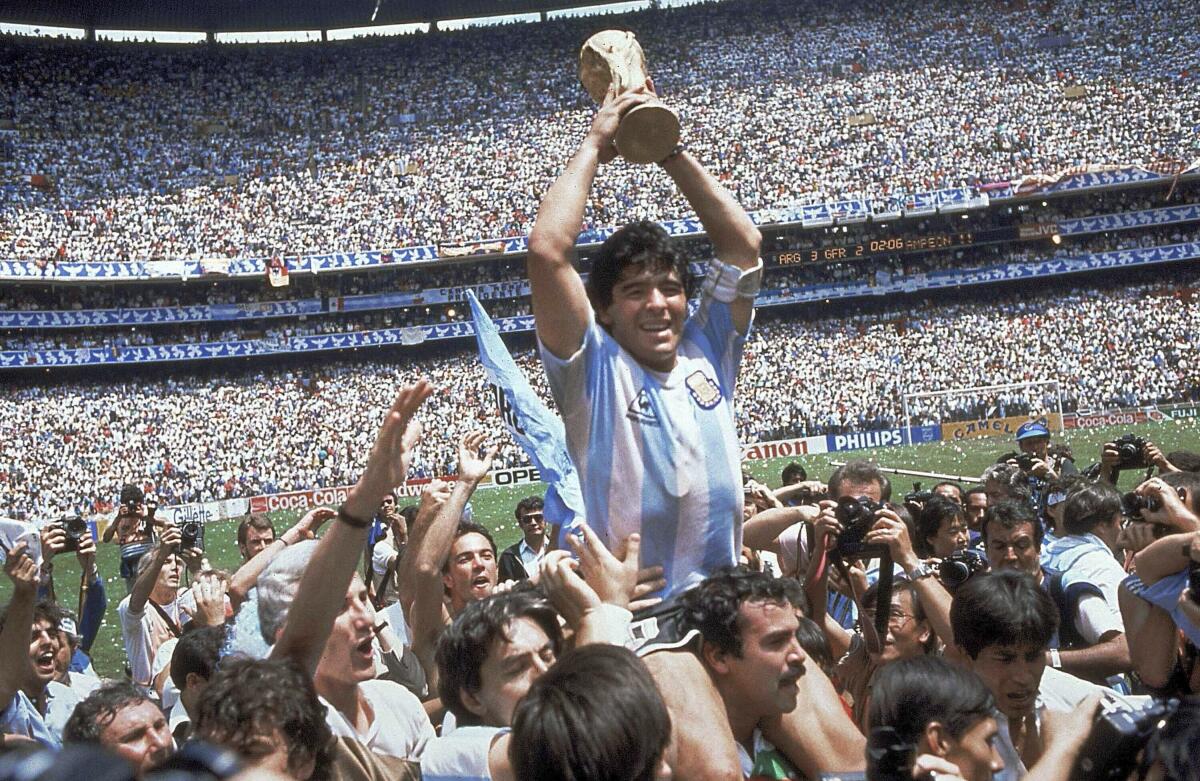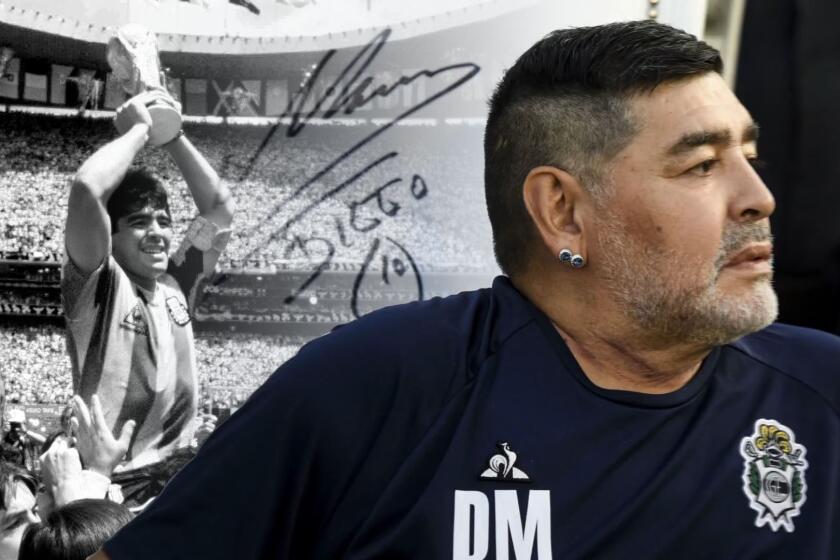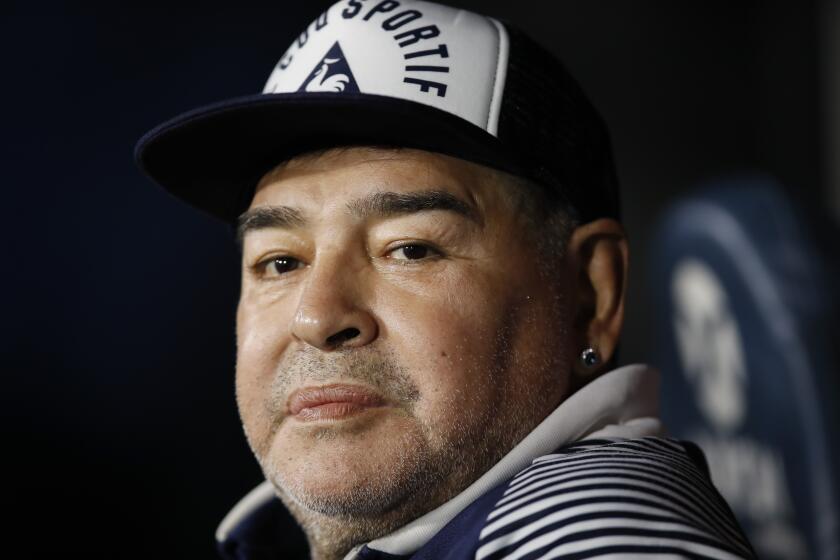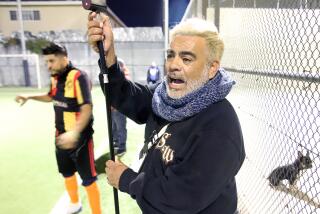Appreciation: Diego Maradona lived the way he played, with reckless joy

Five years ago, an overweight Diego Maradona played in a charity soccer match in Colombia to promote world peace. What made the game memorable wasn’t the penalty kick he scored, but what happened after.
Maradona was escorted off the field by a halo of security guards, one of whom was pushed into him near the crowd that formed around them. Maradona stepped back to create space and unleashed a kick to the groin area of the yellow-jacketed staffer.
Mind you, the purpose of the event was to promote world peace.
His post-match actions inspired widespread condemnation, but not from everyone. In some places, his indefensible behavior inspired feelings of warmth.
The impulsiveness and childishness that made Maradona wreak havoc in the Bogota stadium is what made him the most dominant and joyous player of his generation, perhaps ever. By then, the world accepted his shortcomings as a price for his genius.
So, whenever Maradona did something deplorable in retirement, whether it was crudely mocking Pelé or drunkenly fighting in the streets of Croatia, there was always as much laughter as outrage. How could anyone judge a soul bold enough to slalom through England’s entire defense in the 1986 World Cup quarterfinals?
Diego Maradona, who led Argentina to victory in the 1986 World Cup but was tormented by drug abuse and illness in his later years, has died at 60.
One of the greatest spirits of the 20th century was extinguished Wednesday. Diego Armando Maradona died of a heart attack at the age of 60.
In most sports, there are clear delineations that separate the player from the person. Not soccer. Outside of boxing, which exposes depths of character that wouldn’t surface in ordinary life, no form of competition reveals as much about its contestants.
The game is similar to life in that nothing is happening most of the time. Goals are like distant destinations. Players are defined by their philosophies on how to go about these journeys, similar to how people are identified by their ideas on how to live. Soccer players’ concepts of how to play the game often mirror their approaches to life.
Maradona, who was born into extreme poverty in Buenos Aires, was fearless. He didn’t hold back, on the field or off.
Standing only 5-foot-5, he was like Barry Sanders with a ball at his feet — powerful, with a low center of gravity, capable of shifting directions at an instant. His technique was unmatched by any of his contemporaries. He didn’t have much of a right foot, but he didn’t need one. His left was that good. He saw the field better than anyone, which made him a gifted passer. He was thoroughly unpredictable.
As a player, Maradona was in the middle of everything, literally. He imposed his will on games like no one before or after him.
When Argentina won the World Cup in 1986, his 567 touches were tied for the most in the tournament, according to ESPN Stats & Info. Maradona scored or assisted on 10 of Argentina’s 14 goals.
Even after he was suspended when testing positive for cocaine, even after age diminished him as a dribbler, Maradona was the center of Argentina’s attack at the 1994 World Cup. Predictably, Argentina unraveled after Maradona was expelled from the tournament because of another positive drug test, this one for ephedrine.
He exerted this kind of influence when soccer was at its most defensive — and violent.
Maradona was frequently subjected to the types of tackles that would draw straight red cards today. He was the most-fouled player across each of the three World Cups from 1982 to 1990.
He played most of his career before the implementation of the back-pass rule or the change to the offsides rule, which were designed to promote more scoring. He played in Italy’s notoriously defensive Serie A. Teams were awarded only two points for a win then, which made clubs less inclined to emerge from their bunkers.
Which made everything Maradona feel all the more supernatural.
His improvisational abilities provided a stark contrast to the game around him, which was becoming more systematic, more defensive. He spoke his mind as other star players became more mindful of their public images. When Argentina was beaten by Germany in the 1990 World Cup final, he openly cried on the field.
In time, he became more than a soccer player. He became a populist symbol.
Imagine if Allen Iverson had become the greatest basketball player in history. Or if Mike Tyson had surpassed the achievements of Ray Robinson and Muhammad Ali.
That was Maradona.
The unpredictability that characterized his play was also a trademark of his private life. He lived how he played, merrily and recklessly. He partied hard, cocaine his drug of choice.
Diego Maradona was recovering Wednesday after an operation for bleeding in his skull, his personal doctor said.
His successors learned from his setbacks. Players now are more careful with their bodies. Something was lost in the improvements in professionalism, however.
Lionel Messi is a more consistent finisher than Maradona ever was. Messi has played more games and scored more goals.
But he’s not Maradona, similar to how LeBron James isn’t Michael Jordan. Messi will never elicit as much adoration or hatred. He will never be as good, many will argue.
Whatever the statistics read, regardless of who says Messi is better than Maradona, nothing will change the minds of people who remember the shock they experienced when Maradona launched himself headfirst into an ankle-high cross or suddenly flipped a ball up to himself so he could deliver a pass with a bicycle kick.
And if Maradona became a spectacle in retirement, well, of course he did. That’s who he was.









